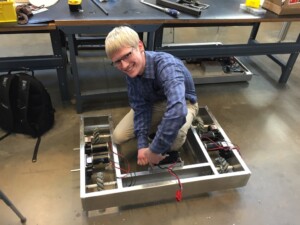All Youth Deserve Performing Arts Experiences–They Promote Agency, Empathy, and Project Management

Hank Stratton teaches acting at the School of Theatre, Film, and Television at the University of Arizona. Ted Kraus is the technical director. Together they represent performance and production. They both see the theater as problem-based learning where students learn success skills that translate into every profession. We recently talked with Hank and Ted for our podcast, you can hear that episode here.
After hearing thunderous applause after a sixth-grade performance of McBeth, Stratton was hooked on theatre.
After discovering theatre, Kraus did production, stage management, lighting design, and finally found shop. He appreciated the rewards and accountability of building scenery. He was drawn to the back of the house for “the puzzles, problem-solving, and choosing the right solution for the context.”

Like instrumental music, theatre is a series of steep learning curves—often physical, technical, and social—culminating in public performances. Stratton finds theatre slightly more subjective with many different approaches. The performing arts provide a series of sprints where youth develop a growth mindset.
When Stratton directed the Broadway revival of The Man Who Came to Dinner he spotted a mistake during a rehearsal and asked the actress about it. She said, “I made a choice.” He asked, “did it work?” “No,” she answered. “Could you make another choice?” asked Stratton.
This simple focus on informed choices worked as a coaching strategy. Stratton and Kraus found that performance and production overlap on conscious choices made. In production, the door fits or it doesn’t. In performance, the move worked or it didn’t.
“Empathy is everything to an actor,” said Stratton. It’s key to connecting the story and with others on stage and the audience.
Like the military, Stratton and Kraus conduct an after action review after every performance to develop the process of self-assessment. They ask, “What was successful about what we did?” Then they dig in and provide direct and constructive feedback about what could be better. It’s a lifelong habit of cultivating improvement without anxiety.
Kraus teaches a project management course (using the Project Management Institute framework) as a process to solve problems. He finds theatre as a great example of teaching how to break down a complex problem into component parts and accomplish what had seemed impossible.
They agree that theater teaches self-awareness, empathy as well as project management. They’d like to see all young people participate in the performing arts from elementary school through college—and see the benefits as life long.
For more, see:
- Project-Based Learning and the Performing Arts: A Match Made in Heaven
- Music Builds Maker Mindsets: The Power of the Performing Arts
- Arts and Unique Abilities
- Arts-Integration for the Future of STEAM Learning
Stay in-the-know with innovations in learning by signing up for the weekly Smart Update.
This post was originally published on Forbes.








0 Comments
Leave a Comment
Your email address will not be published. All fields are required.